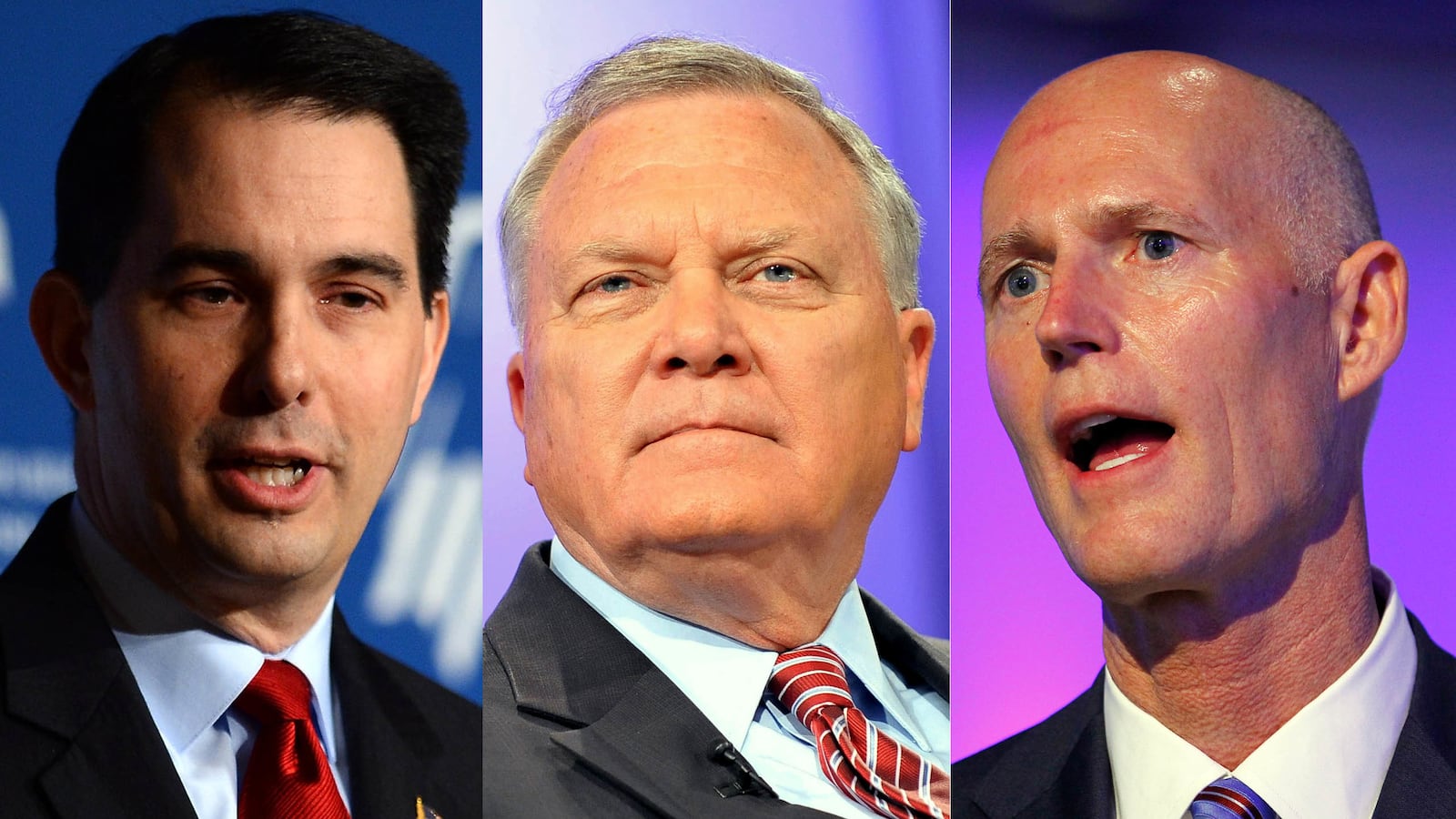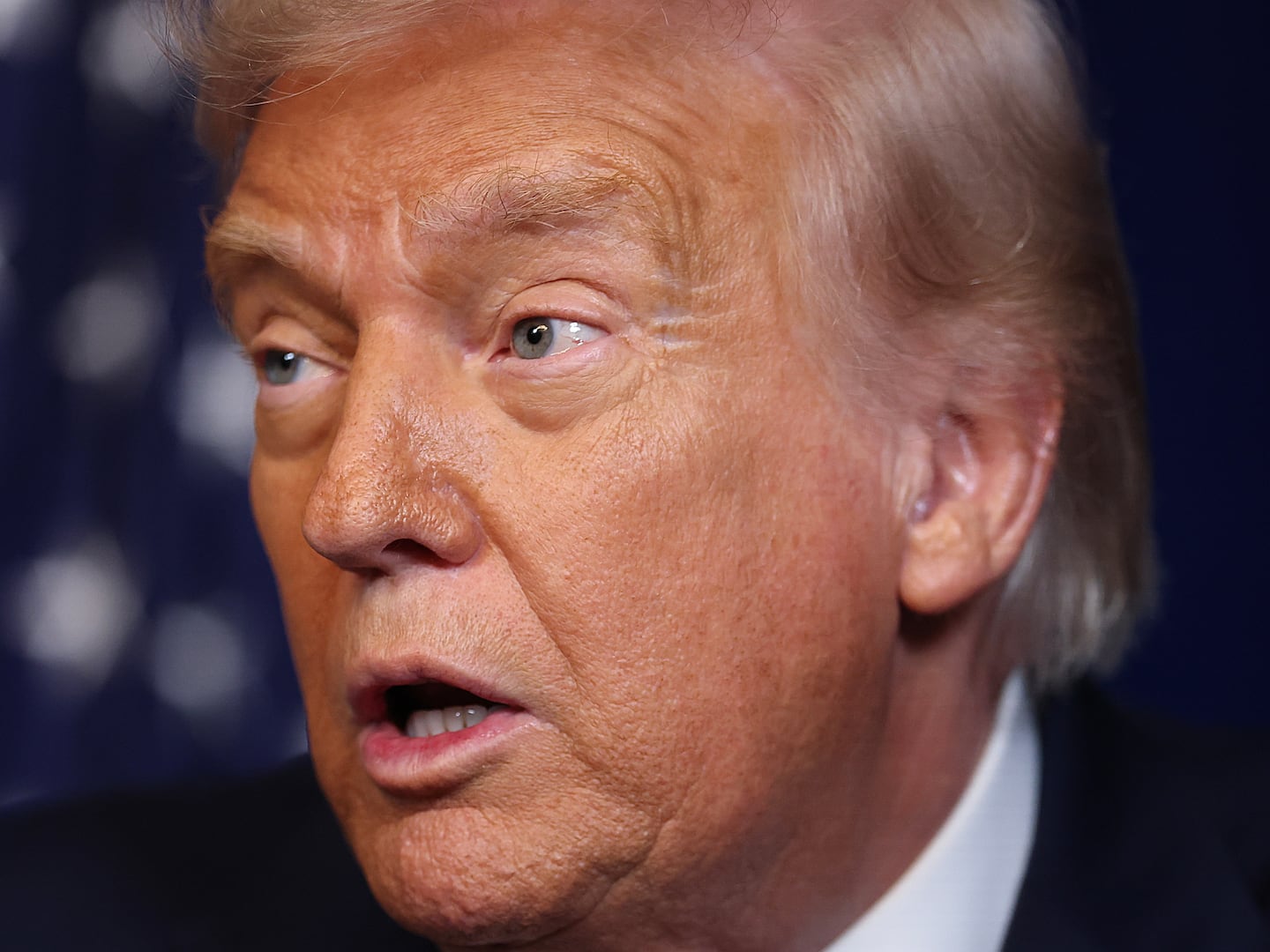Senate, Senate, Senate. Of course it’s the most important battle this fall, the top fight on the card. But there’s a lot of other action to watch. I’ll write plenty about Senate races between now and Election Day, but today, let’s look at the key governors races. From a liberal point of view, there are five that are clearly the most important; five where taking out the right-wing incumbent would be gratifying either for its own sake, for what it might suggest about 2016, or in some cases both. Here we go, in order:
1. Rick Scott, Florida. Scott seems to be maintaining a slender lead over Republican-turned-Democrat Charlie Crist, who’s running against him. But it’s all margin-of-error stuff at this point—Scott leads narrowly in most polls, and every so often one finds Crist ahead. There is a third candidate, Libertarian Adrian Wyllie, who’s running between 4 and 8 percent and, according to one poll, drawing equally from Scott and Crist.
The most important thing about this race is not political but—lo and behold!—substantive. If Crist wins, the biggest state in the union that is not participating in Obamacare may do so. Governor Crist would have to battle with the legislature about accepting the Medicaid money, but this has been a central plank of his campaign, just as refusing the money has been central to Scott’s campaign. If Crist were to win and push acceptance of the funds through, the state could gain $66 billion in federal dollars over the next decade and insure 1.1 million more people. It’d be a huge step forward for the Affordable Care Act.
And of course there are 2016 ramifications as well. In most states that have taken the Medicaid money, doing so has turned out to be pretty popular. If Crist gets in and manages to implement Obamacare in a reasonably successful way, that has to help whoever the Democratic candidate is. And when a party controls a governor’s mansion, its donor base is more engaged and its network of local activists and volunteers is more energized.
2. Scott Walker, Wisconsin. I’m confident I speak for all of American liberalism when I say we’d to see this smarmy, smug, self-satisfied little blobfish go down to defeat. Right now, he’s basically tied with Democrat Mary Burke. He’s ahead by three points in one recent poll, she’s up four in another. One factor that could help Walker in turnout terms is that, of the state’s eight congressional districts, the only two in which the races are competitive are GOP-leaning districts, so that could push Republican turnout up a bit. On the other hand, Obama’s job approval in Wisconsin isn’t so bad, at 45-49, so it’s not like a Kentucky or Arkansas, where loads of conservative voters are going to vote just to register their animus toward the president.
I rank Walker second on my list because he’s a potential presidential contender for 2016. The conventional wisdom now in Washington is that he’s the 2016 Tim Pawlenty—the guy who looks good on paper but isn’t ready for prime time. But who knows, the conventional wisdom is wrong all the time about these things. And if somehow Walker were to demonstrate that he’s ready for prime time and capture the Republican nomination, then there’s a chance he could win—only a chance, I think—his home state, and that’s 10 electoral votes that would really alter the Electoral College calculus (the Democrats haven’t lost Wisconsin since 1984). Better just to take him out now and not have to worry about such exigencies.
3. Nathan Deal, Georgia. A true wingnut, former House member Deal has presided over the new gun law that lets people pack heat in America’s busiest airport, spoken fondly of the old Stars and Bars, and sent most of the other signals you’d expect someone like that to send to reactionary white voters. While in the House, he was something of a birth-certificate “truther.” That all combines to stand a chance of rendering Deal a bit much even by the hardened standards of the Peach State, where polls show him one or two goober peas ahead of Jason Carter, grandson of Jimmy. Carter is well to grandpap’s right—he supported the new gun law, for example. But at least he’d probably not say things like, “My wife tells me she could look at her sixth-grade class and tell ya which ones are going to prison and which ones are going to college.”
But here’s the real importance of this race: A Carter win would terrify the GOP heading into 2016. Remember, Obama lost the state by just eight points. I can guarantee you that on the day after the election in 2012, when political pros on both sides saw that result, their universal next thought was: Holy smokes, Hillary could win that state. And indeed, while statewide opinion polling on Clinton vs. GOP field in ’16 is scant, as often as not, it shows that she leads the major Republicans already. A Carter victory would start intensive “Will Georgia Turn Blue?” talk. Whereas a flip of Wisconsin’s 10 electoral votes would make life a little more complicated for the Democrats, a flip of Georgia’s 16 would pulverize any GOP chances of the White House.
4. Rick Snyder, Michigan. Like Walker, Snyder is an anomaly, a conservative Republican who won in a usually slightly left-of-center state in 2010, the tea party year. He’s been better than Walker—he did, for example, come around to accepting the Obamacare Medicaid money after having initially opposed it. And he signed a bill raising the minimum wage. But he’s been plenty conservative, too, pushing for hugely controversial right-to-work legislation, and presiding over the usual scorched-earth public education policies. Snyder is basically tied with Democrat Mark Schauer.
Snyder is too conservative for that state. It’s as if, oh, Indiana had a Democratic governor—it’s something that happens, but it’s just not the natural order of things. Besides which, if he wins reelection, we’re going to have to endure a mountain of GOP spin about how the party is going to take back Michigan in ’16, even though Republicans haven’t carried it since 1988. If he loses, there’s a sporting chance the media will be less gullible about such nonsense
5. Paul LePage, Maine. This one has no 2016 ramifications. The Democratic presidential candidate will win Maine, although the state is one of two where it’s legal to split electors, so the Republican could conceivably win one of the state’s four electoral votes. But LePage is just America’s highest-ranking elected baboon, with a long string of comments that aren’t just “incendiary,” to employ one of the standard euphemisms, but simply embarrassing to the Republican Party, the state of Maine, and the human race. He’s running just a hair behind Democrat Mike Michaud, a member of the House of Representatives. There’s an independent candidate polling in the low double digits and stealing more from Michaud than LePage, so he might be the incumbent’s salvation.
There are several other important governor’s races. I left Kansas’ Sam Brownback off my list because it already looks as if, while there’s still plenty of time on the clock, he’s going to lose. But the significance of a Republican incumbent governor losing in Kansas would be pretty great, although obviously it wouldn’t impact 2016, since a Democratic presidential candidate will win Kansas the same year the great and powerful Oz returns in his hot-air balloon to the state fair. Arizona, Colorado, and Illinois are all tight races, too. There’s no denying it. Election night is likely to be a long night for liberals. But catching glimpses of the concession speeches from the above quintumverate would make the night a lot less painful.






